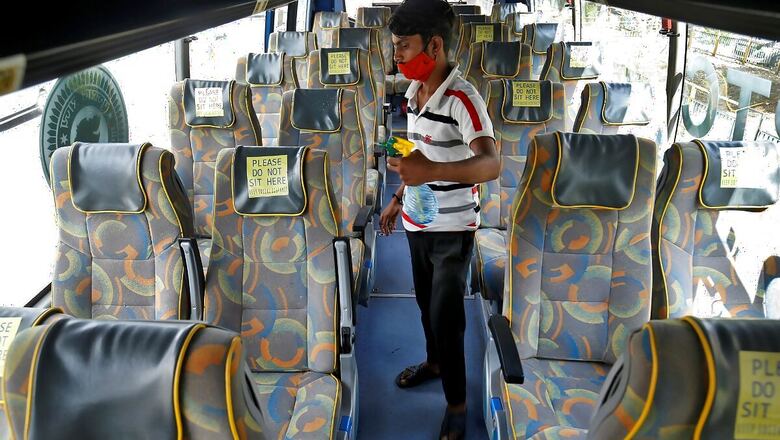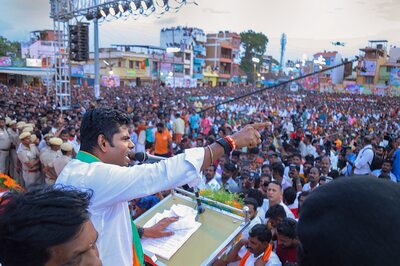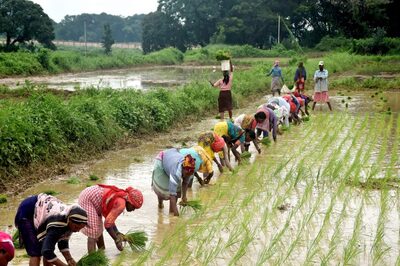
views
In what could be a testing of waters for the eventual reopening of schools, the central government has allowed states and Union Territories to permit 50% of teaching and non-teaching staff in schools. The Unlock 4.0 guidelines issued by the Ministry of Home Affairs (MHA) on Saturday said this could be for the purpose of online teaching/tele-counselling and related work after September 21.
Schools, colleges and educational institutions will continue to remain closed till September 30.
The guidelines specify that schools in containment zones will not be permitted to call staff and Standard Operating Procedures (SoPs) will be issued by the Ministry of Health in this regard.
Students of classes 9 to 12 have also been permitted to visit school for guidance if it is located outside the containment zones.
Students in rural areas have complained about lack of internet connectivity affecting their studies — this relaxation could help them.
Skill or entrepreneurship training will also be permitted in National Skill Training Institutes, Industrial Training Institutes (ITIs), short term training centres registered with National Skill Development Corporation or State Skill Development Missions or other central or state ministries. The National Institute for Entrepreneurship and Small Business Development (NIESBUD), Indian Institute of Entrepreneurship (IIE) and their training providers will also be permitted.
Higher Education Institutions only for research scholars (Ph.D) and postgraduate students of technical and professional programmes requiring laboratory/experimental work will also be permitted by the Department of Higher Education (DHE) in consultation with the MHA, based on the assessment of the situation, and keeping in view incidence of coronavirus in the respective states.
The MHA has allowed metro services to resume in a graded manner from September 7 and the Ministry of Housing and Urban Development will issue the SOP in this regard.
The MHA has also restricted states from imposing local lockdowns outside containment zones without consulting the Centre. Traders and businesspersons have complained against weekend lockdowns, like the one in Uttar Pradesh and Haryana, and arbitrary lockdowns like the one in West Bengal. The Centre is in favour of allowing as much economic activity as possible and this is the first set of guidelines where the power to impose restrictions in the interest of public health has been taken away from local administration.
While open-air theatres have been permitted, cinema halls will continue to remain shut. This decision was taken even though the Ministry of Information and Broadcasting in the last lockdown had proposed allowing cinemas with 25% capacity.
Swimming pools, entertainment parks, theatres and similar places will also remain shut and international air travel of passengers, except as permitted by MHA, will not be allowed.
Social, academic, sports, entertainment, cultural, religious, political functions and other congregations have also been permitted for up to 100 people, with the mandatory wearing of face masks. However, for weddings and funerals, the number of people permitted continues to be 50 and 20, respectively. With electoral activities picking up in states like Bihar, such a congregation-related relaxation assumes significance.
The coronavirus-induced nationwide lockdown was first announced by Prime Minister Narendra Modi from March 25 and extended in phases till May 31. The Unlock process began on June 1 with the graded reopening of commercial, social, religious and other activities.
Unlock 4 will come into effect from September 1 and will continue till September 30. The new guidelines are based on feedback received from the sates and UTs, and extensive consultations held with related central ministries and departments, the home ministry said.
Lockdown will continue to be implemented strictly in the containment zones till September 30. There will be no restriction on inter-state and intra-state movement of persons and goods. No separate permission, approval, e-permit will be required for such movements.
Vulnerable persons, such as those above 65 years of age, with co-morbidities, pregnant women, and children below the age of 10 years, are advised to stay at home, except for meeting essential requirements and for health purposes, the home ministry said.
The use of Aarogya Setu mobile application will continue to be encouraged, it said.
India’s coronavirus tally raced past 34 lakh on Saturday with a single-day spike of 76,472 cases, while the number of recoveries surged to 26,48,998, pushing the recovery rate to 76.47%, according to the Union health ministry. The total number of cases rose to 34,63,972, while the death toll climbed to 62,550 with 1,021 more people succumbing in a span of 24 hours, the ministry’s data showed on Saturday morning.




















Comments
0 comment